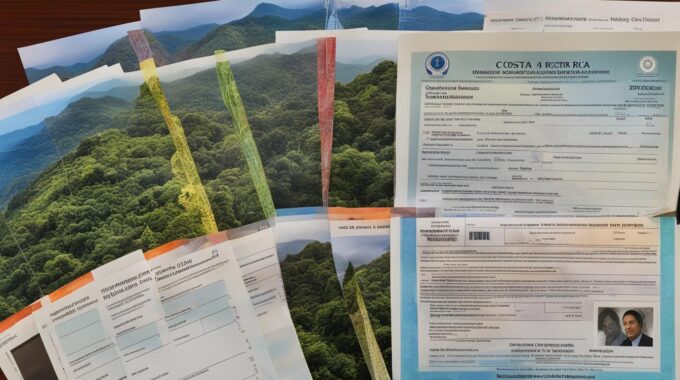At the forefront of property financing in Costa Rica, GapInvestments.com stands as a beacon for…

Understanding Requirements for Costa Rica Immigration Sponsorship
Are you considering immigrating to beautiful Costa Rica? Understanding the requirements for immigration sponsorship is crucial to ensure a smooth and efficient process. Whether you’re retiring, studying, working, renting property, or joining your spouse in the country, Costa Rica offers different types of temporary residency options to suit your needs.
Costa Rica Immigration Experts (CRIE) is here to help. As a reputable organization specializing in immigration, residency, and citizenship matters, CRIE provides expert assistance and guidance throughout the immigration process. Contact CRIE through their website (www.crie.cr), WhatsApp (+506 7236 6906), or email (info@crie.cr) to get started.
Let’s take a closer look at the specific requirements for Costa Rica immigration sponsorship:
Key Takeaways:
- Costa Rica offers different types of temporary residency options for retirees, students, executives, representatives, renters, and spouses.
- Common requirements for temporary residency include request letters, photographs, fee payments, legalized and authenticated documents, fingerprint registration, and consular registration.
- Retirees need a lifetime pension certification, while students and volunteers require additional documentation such as acceptance letters and proof of financial means.
- Residency applications should be made while legally in the country, and non-Spanish documents must be translated and legalized.
- The work permit process is more complex and restrictive, with high requirements to prove the job cannot be filled by a Costa Rican.
Working in Costa Rica without Residency
While residency is required to work in Costa Rica, there are alternative options for foreign nationals to earn an income without being a resident. One option is to work remotely for a non-Costa Rican company or as a freelancer, earning income from abroad while living in Costa Rica under the rentista visa. However, it is important to apply for legal residency if the stay is longer than three months. This option allows individuals to enjoy the benefits of working in a beautiful country while maintaining their status as non-residents.
Working Remotely as a Non-Resident
Working remotely as a non-resident in Costa Rica has become increasingly popular, especially with the rise of digital nomads and remote work opportunities. Under the rentista visa, individuals can live in Costa Rica while earning income from abroad. This option is particularly attractive for individuals who have online-based businesses, work as freelancers, or are employed by companies based outside of Costa Rica.
| Pros | Cons |
|---|---|
| Freedom to work from anywhere in Costa Rica | Residency required for stays longer than three months |
| Opportunity to experience the natural beauty and culture of Costa Rica | Must comply with local tax regulations in home country |
| No restrictions on the type of work or employer | No access to certain benefits and services available to residents |
It’s important to note that while working remotely as a non-resident in Costa Rica is a viable option, individuals are advised to consult with a legal professional to ensure they comply with local tax regulations and other legal requirements in their home country.

“Working remotely as a non-resident in Costa Rica allows individuals to enjoy the best of both worlds – the freedom to work from a tropical paradise and the ability to maintain their non-resident status. It’s a great option for digital nomads, freelancers, and individuals employed by companies based outside of Costa Rica.”
Becoming a Costa Rica Resident
To qualify for Costa Rica immigration sponsorship, individuals can apply for various types of residency permits, including Pensionado, Rentista, Inversionista, Representante, or Permanent residency. Each residency category has specific eligibility criteria and requirements. For example, Pensionado requires individuals to have a monthly income from a pension or other source, while Rentista requires a certain investment in a business.
The residency application fee varies depending on whether it is applied for from outside or within Costa Rica. It is important to carefully follow the application process, which involves completing an application form and providing supporting documents such as birth certificates, marriage certificates (if applicable), police records, proof of income or financial means, and proof of registration with a Costa Rican consulate.
If an individual is interested in obtaining a Costa Rica work permit, they should be aware that the processing time can take several months. It is crucial to adhere to the application process, including fingerprint registration and legalizing documents through apostille or the Costa Rican consulate.
While some foreigners engage in the practice of “border run” to reset their tourist visa every 90 days, this is not condoned by the authorities. Overstaying the visa can result in fines. Therefore, it is advisable to pursue the appropriate residency permits for long-term stay in Costa Rica.
FAQ
What is Costa Rica Immigration Experts (CRIE)?
Costa Rica Immigration Experts (CRIE) is a reputable organization that provides assistance and guidance for individuals seeking to immigrate to Costa Rica. They specialize in immigration, residency, and citizenship matters, ensuring a seamless and efficient immigration process.
How can I contact Costa Rica Immigration Experts (CRIE)?
You can contact Costa Rica Immigration Experts (CRIE) through their website (www.crie.cr), WhatsApp (+506 7236 6906), or email (info@crie.cr).
What types of temporary residency options does Costa Rica offer?
Costa Rica offers various types of temporary residency options, including retirement, study, executive or representative work, renting property, and joining a spouse in the country.
What are the common requirements for temporary residency in Costa Rica?
Common requirements for temporary residency in Costa Rica include a request letter, passport-sized photographs, payment of fees, legalized and authenticated documents such as birth certificates and criminal record certificates, proof of fingerprint registration, and proof of consular registration.
What are the specific requirements for retirees applying for temporary residency?
Retirees applying for temporary residency in Costa Rica need to provide a lifetime pension certification indicating a monthly pension of more than $1,000.
Are there additional requirements for students, teachers, researchers, interns, and volunteers applying for temporary residency?
Yes, students, teachers, researchers, interns, and volunteers applying for temporary residency in Costa Rica need to provide additional documentation such as acceptance letters, proof of financial means, and letters from educational institutions or volunteer programs.
Can residency applications be made while in Costa Rica?
Yes, all residency applications should be made while the individual is legally in Costa Rica.
What should be done with documents issued in a language other than Spanish?
Documents issued in a language other than Spanish should be translated and legalized for residency applications in Costa Rica.
How complex is the application process for a Costa Rica work permit?
The application process for a Costa Rica work permit is more complex and restrictive, with high requirements to prove that the job cannot be filled by a Costa Rican national. Work permits fall under the “Special Category” of immigration permits and can take several months to process.
Can foreign nationals earn income in Costa Rica without being a resident?
Yes, foreign nationals can work remotely for non-Costa Rican companies or as freelancers, earning income from abroad while living in Costa Rica under the rentista visa. However, legal residency should be applied for if staying longer than three months.
Is it possible to open a business in Costa Rica as a temporary resident permit holder?
Yes, it is possible to open a business in Costa Rica as a temporary resident permit holder. However, individuals are not allowed to work in the business and must hire Costa Rican employees.
Who is eligible for permanent residency in Costa Rica?
Permanent residency in Costa Rica is an option for individuals who have blood relations to a Costa Rican citizen or have lived in the country with a temporary residence permit for at least three years. This allows them to work in Costa Rica.
What are the different types of residency permits individuals can apply for in Costa Rica?
Individuals can apply for different types of residency permits in Costa Rica, including Pensionado, Rentista, Inversionista, Representante, or Permanent residency.
What are the specific requirements and eligibility criteria for each residency category?
Each residency category has specific requirements and eligibility criteria, such as having a monthly income from a pension or other source, investing a certain amount in a business, being a director of a company, or having blood relations to a Costa Rican citizen.
How much is the residency application fee in Costa Rica?
The residency application fee in Costa Rica varies depending on whether it is applied for from outside or within the country.
What documents are required for the Costa Rica work permit processing?
The Costa Rica work permit processing requires completing an application form and providing supporting documents such as birth certificates, marriage certificates (if applicable), police records, proof of income or financial means, proof of registration with a Costa Rican consulate, and more.
Is the “border run” practice encouraged by the authorities?
Engaging in the “border run” practice of leaving the country every 90 days to reset the tourist visa is not condoned by the authorities. However, many foreigners follow this practice. It is important to note that overstaying the visa can result in fines.


